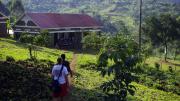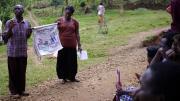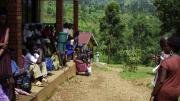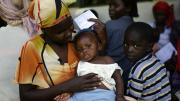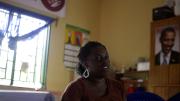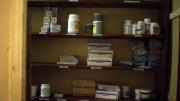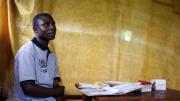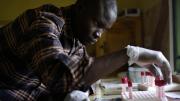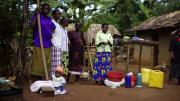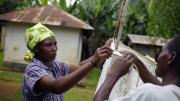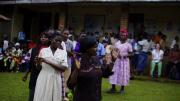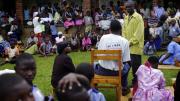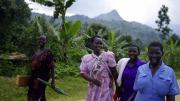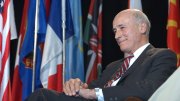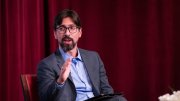Walking up Mount Elgon in rural Uganda on a summer morning, Kiahana Brooks ’10 greets passersby in Lugisu, the local language: “Mulembe.” ("Good morning.") As uniform-clad children pass on their way to school, they cry out “Mzungu”—foreigner—“how are you?”
When she arrives at Beatrice Tierney Health Centre in Bumwalukani village, in time for the clinic’s 9 a.m. opening, there is already a crowd waiting. In the hills and fields surrounding the clinic, other patients are still making their way there on foot. Some will spend all day waiting to be seen; this is part of the experience of going to a clinic in many parts of Africa, but Beatrice Tierney offers something most rural clinics don’t: a staff physician who conducts HIV testing, with on-site analysis and rapid results. The clinic also distributes free condoms paid for by the government (and some donated by volunteers).
In her work at the clinic, Brooks—who has since graduated and now attends nursing school at the University of Pennsylvania—puts the patients’ waiting time to good use: as an educator for the nonprofit Foundation for International Medical Relief of Children, she delivers health information to this captive audience (including lessons on malaria, HIV, and hygiene which she designed herself).
The information she presents is not what would be taught in the United States or even a neighboring country: Brooks has carefully tailored her messages to local conditions and concerns. For instance, in wealthy countries, doctors dealing with HIV-positive mothers routinely tell these women not to breastfeed their babies, but to use formula instead, due to the transmission risk breastfeeding carries. But many mothers in Bumwalukani don’t have access to formula; besides, the formula must be mixed with water, which carries a risk of waterborne illness. So Brooks teaches instead about alternative options. Even when a mother breastfeeds her child, the virus is seldom transmitted orally as long as the child doesn’t have open mouth wounds. But bottle feeding can produce small lesions, so the lesson recommends that mothers either breastfeed exclusively or bottle-feed exclusively, but avoid mixing the methods.
Brooks’s work here has also involved writing skits for a community theater troupe that performs educational skits about HIV, sexual health, family planning, malaria, and other health topics. At 10:30, she heads across the street from the clinic, to the home of one of the actor-educators. Over hot, sweet tea and dumplings, the troupe rehearses a skit about parenting. The plot: Fed up with her child’s crying, a woman approaches a string of relatives, asking them what to do. They give her bad advice: give the baby some sweets, just let it cry, let it lie in the fields to make it healthy and calm. When the woman’s husband comes home, he tells her the baby seems sick and she should take it to a clinic. She obliges, and at the clinic gets reprimanded by nurses and doctors. This overly stern reaction is meant to elicit some laughs, but also delivers the skit’s main messages: wash your hands often, clean your breasts before breastfeeding, expect to feed a child up to eight times a day until the child reaches six months of age, eat a healthy diet including plenty of vegetables, don’t give the child sweets to calm it down. The skit ends with a community health worker visiting the woman at home, observing her following the advice she got at the clinic, and telling her she’s doing an excellent job.
Rehearsing the skit, the actor playing the main character uses her own baby, pretending to breastfeed it, then handing the child off to other actors. Brooks watches in mild disbelief. “We need to get them a doll,” she says. She has worked on helping the troupe—whose work costs about $80 a month for props, transportation, and food (members receive a complimentary meal for each performance)—become financially self-sufficient, through growing and selling food, and making and selling crafts such as potholders.
The theater company was founded in 2008 with the help of Bianca Verma ’10. Verma, who now works for Project HEALTH in Chicago, says she didn’t start the troupe, but rather guided the troupe members, who are community health workers, toward execution of their own idea to distribute their health knowledge more widely. Like Brooks, Verma paid close attention to local conditions in crafting the scripts she wrote. She made sure to answer the questions she heard people raising over and over at the clinic: Does HIV testing hurt? Is it really confidential? And she incorporated social issues that, though sensitive, are important to discuss, such as the common problem of married men being unfaithful and then infecting their wives.
Finished rehearsing, the actors walk to Bushika Health Centre, the clinic where they will be performing, carrying props on heads and under arms. They perform the skit to a mix of children and adults from the clinic and adjacent school, then return to the clinic for lunch: huge steaming pots of rice, beans, okra, and cabbage. Brooks doesn’t eat right away. The clinic’s power is out and the generator isn’t working; she needs to call the repairman. Outside, patients are still waiting.
